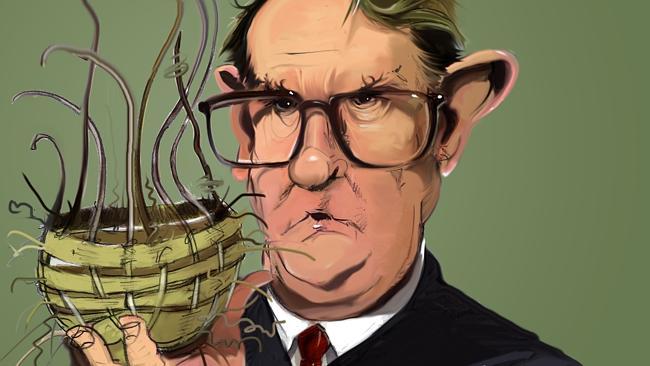
The arrival of repetitive strain injury in Canberra in the early 1980s threatened to bring the national capital to a halt. Office workers were “dropping like flies”, The Canberra Times reported.
The president of the Senate warned parliamentarians public service productivity had been seriously affected by an epidemic of RSI and the production of Hansard could be delayed. When the Hawke government announced it would establish an RSI taskforce to investigate the case for compensation, one cabinet sceptic heard cash registers ringing.
“There is, as any shearer knows, combinations of muscular and joint stress which cause backache,” Peter Walsh, the finance minister at the time, wrote later. “There are also phenomena known as malingering.”
At the height of RSI mania in 1984, public servants were seven times likelier to be afflicted by RSI than private-sector workers performing similar tasks.
“The highly variable rates of reported RSI among clerical workers in different departments might be more a function of the number of activists beating up the ‘epidemic’, than of any real variation in incidence,” wrote Walsh.
Walsh, who died last week, aged 80, was uncommonly endowed with common sense, a virtue in short supply in today’s federal Labor Party. Confessions of a Failed Finance Minister, Walsh’s memoir published 20 years ago, provides a pertinent analysis of the moral arrogance that transformed Labor from the party of common people into the voice of the Balmain basketweavers.
Walsh anticipated almost all of the corrosive trends to which the ALP has since succumbed. The party’s unseemly intimacy with public service unions, its appeasement of environmental activists at the expense of working-class jobs, its support of reckless solutions to possible global warming and the rusting off of the party’s supporters in the outer suburbs are among the events foretold.
As finance minister Walsh had an important role to play in the bold reforms of the Hawke government. Yet he noted a lapse back towards fiscal indiscipline and a fickleness towards the principles of privatisation.
Walsh foresaw the “cult” of political correctness that routinely smothers civic debate in these hypersensitive times. Its most pernicious consequence, said Walsh, was cultural relativity and a mood that threatened to undermine Australia’s Anglo-Celtic culture. “What psychotic disorder, what deep-seated se1f-loathing, causes people who are the beneficiaries of that heritage to constantly vilify and denigrate it?” he asks.
Labor, he suggested, was in danger of succumbing to a new illiberal force. The authoritarian Right, often associated with religion, had been superseded by “an authoritarian group which regards itself as Left progressive”.
“They are social engineers determined to control what people do, what they say — and if they could what people think — if necessary by legislation,” he wrote. Walsh strongly objected to Paul Keating’s amendments to the 1994 Racial Discrimination Act including the notorious section 18C, outlawing speech that might cause offence to an identifiable ethnic or racial group.
Having voted in favour of the 1991 spill against Bob Hawke, Walsh later conceded that Keating’s legacy would have been better had he not become prime minister. Keating’s big mistake was to believe “power could be retained by pandering to vocal minorities with good media connections: green ideologues, the arts lobby, gender feminists, Aboriginal and ethnic activists”. A “propensity for self-delusion” meant Keating was unaware of the potential backlash and gullibly accepted ethnic activists’ claims “to actually speak for those they purport to represent”.
Readers unfamiliar with Walsh’s life story might be curious to know which university was responsible for training a politician in the art of common sense and endowing him with the gift of sceptism. In fact Walsh left school at the age of 10, like many of his peers. All were literate and numerate, Walsh claimed, even though none of had enjoyed “preschool” experience, let alone “quality” childcare.
“Like the previous thousands of generations of homo sapiens, we spent our infancy with our mothers,” he wrote.
Walsh was sadly absent from public debate in his latter years, but Confessions stands as an abiding record of the attitude that once prevailed in the Labor Party as the home of the cultural outsider. Increasingly, Walsh noted, Labor had become an instrument of the tertiary-educated establishment, prepared to sacrifice blue-collar jobs and opportunities “to appease bourgeois Left and middle-class trendoids in the gentrified suburbs of Sydney and Melbourne”.
Walsh was strongly critical of the ruthless, opportunistic politicking of his former cabinet colleague, Graham Richardson.
Walsh claimed Richardson assisted and encouraged green extremists to launch a multi-million-dollar attack on the timber industry in four states. For those who held Richardson’s “amoral” view of politics, Walsh wrote, “holding power is an end in itself. Others might have different value judgments seems to be beyond their comprehension.”
Walsh surely could not have imagined the further degrading of the Labor Party from the “whatever it takes” era of Richardson to the “woteva” generation represented by Sam Dastyari. Surely not even in his most dystopian imaginings would he have imagined a party so incapable of accommodating disagreement that it would consider expelling Martin Ferguson, a former minister and president of the ACTU. Incredibly, the dispute is about the merits of public ownership and the heavy-handed socialism from which Labor was retreating in the1980s.
Walsh, however, would not have been surprised by the chaos in the Senate, where an eccentric collection of minor party and independent senators with doubtful mandates take turns to muck things up.
Increasing the number of senators by 12 was the first-term Hawke government’s least defensible decision, said Walsh. He warned that expanding the Senate reduced quota and therefore “automatically increases the chance of electing ratbags and single-issue zealots”. In certain circumstances the Senate could become permanently deadlocked.
He wasn’t wrong.
Nick Cater is executive director of the Menzies Research Centre.


